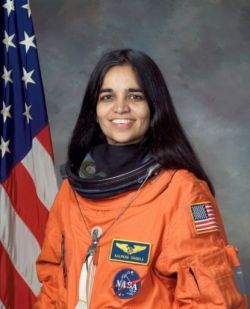Kalpana Chawla
Kalpana Chawla (17 March 1962 – 1 February 2003) was an Indian-American astronaut and aerospace engineer. She was the first woman of Indian origin to go to space. Kalpana flew on two space missions – STS-87 in 1997 and STS-107 in 2003. She tragically lost her life in the Space Shuttle Columbia disaster during re-entry into Earth’s atmosphere.[1]
| Kalpana Chawla | |
|---|---|

| |
| Kalpana Chawla, NASA astronaut | |
| Born | 17 March 1962 |
| Birthplace | Karnal, Punjab, India |
| Died | 01 February 2003 (aged 40) |
| Place of death | Over Texas, United States (Space Shuttle Columbia disaster) |
| Resting place | Memorial at National Cemetery, Arlington (symbolic) |
| Nationality | Indian-American |
| Occupation | Astronaut, Aerospace Engineer |
| Years active | 1988–2003 |
| Known for | First Indian-born woman in space, STS-87 and STS-107 missions |
| Notable works | STS-87 (1997), STS-107 (2003) |
| Awards | Congressional Space Medal of Honor, NASA Space Flight Medal, NASA Distinguished Service Medal (posthumous) |
| Spouse(s) | Jean-Pierre Harrison |
| Children | None |
| Parents | Banarasi Lal Chawla (father), Sanjyothi Chawla (mother) |
| Religion | Hinduism |
| Website | NASA Tribute Page |
Early Life and Education
Kalpana Chawla was born in Karnal, Haryana, India, into a Punjabi Hindu family. She was fascinated by aviation from an early age and earned a degree in Aeronautical Engineering from Punjab Engineering College in 1982.[2]
She moved to the United States for further studies and obtained a Master’s degree in Aerospace Engineering from the University of Texas at Arlington in 1984, followed by a Ph.D. from the University of Colorado Boulder in 1988.[3]
NASA Career
Kalpana joined NASA’s Ames Research Center in 1988 as a powered-lift computational fluid dynamics researcher. In 1995, she was selected for the NASA astronaut program and completed her training in 1996.
STS-87 Mission (1997)
Her first spaceflight was aboard Space Shuttle Columbia on STS-87 in November 1997. She was responsible for deploying the Spartan satellite and conducted experiments in microgravity.[4]
STS-107 Mission (2003)
Her second flight was on STS-107, a 16-day scientific research mission that ended in disaster when the shuttle disintegrated upon re-entry into Earth’s atmosphere on 1 February 2003, killing all seven crew members.[5]
Legacy
Kalpana Chawla is remembered as a symbol of inspiration, courage, and determination. Several educational institutions, scholarships, satellites, and even a NASA supercomputer have been named after her. She was posthumously awarded the Congressional Space Medal of Honor, the NASA Space Flight Medal, and the NASA Distinguished Service Medal.[6]
Personal Life
Kalpana married Jean-Pierre Harrison, a flight instructor and author. She was an avid reader and enjoyed flying, hiking, and writing poetry. Though she became a U.S. citizen, she always acknowledged her Indian roots proudly.
Honours and Memorials
- Kalpana Chawla Government Medical College, Karnal
- Kalpana Chawla ISRO Space Center, Kerala
- Asteroid 51826 Kalpanachawla named in her honour
- Streets and dormitories in India and the U.S. named after her .
See Also
References
- ↑ https://www.nasa.gov/centers/johnson/home/kalpana-chawla.html
- ↑ https://www.thebetterindia.com/155540/kalpana-chawla-biography-life-india-nasa/
- ↑ https://www.nasa.gov/sites/default/files/atoms/files/chawla_kalpana.pdf
- ↑ https://spacecenter.org/kalpana-chawla-biography/
- ↑ https://www.britannica.com/biography/Kalpana-Chawla
- ↑ https://indianexpress.com/article/india/kalpana-chawla-space-hero-tribute-6261587/
